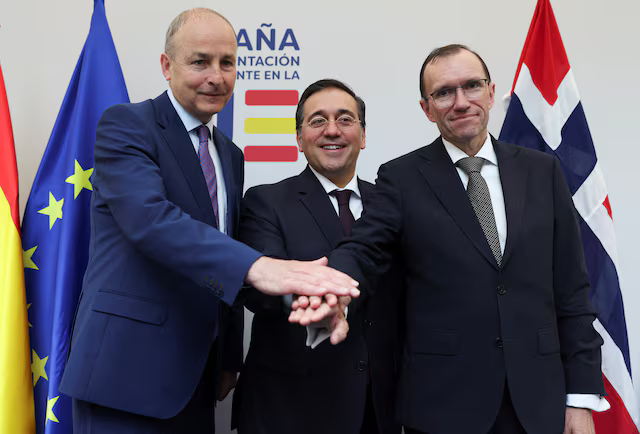
Spain, Ireland, and Norway are poised to formally recognize the state of Palestine today, a significant diplomatic development amidst the ongoing and devastating conflict in Gaza. This recognition marks a pivotal moment in international relations and has already sparked a fierce response from Israel.
The decision comes as Israel’s military continues its relentless assault on Rafah, a city in the southern Gaza Strip. The latest attacks have been particularly deadly, with Israeli forces bombing a tent camp housing displaced Palestinians in what was designated as a safe zone. This tragic incident resulted in the deaths of 45 individuals. The Israeli military confirmed the strike, stating that it targeted Hamas fighters. Concurrently, one of Rafah’s two remaining hospitals, Kuwait Specialty Hospital, has been forced to shut down due to the severity of the ongoing attacks.

The humanitarian toll in Gaza has been catastrophic. Since October 7, at least 36,050 Palestinians have been killed, and 81,026 have been wounded in the conflict. The revised death toll in Israel from Hamas’s attack on October 7 stands at 1,139, with dozens still held captive by Hamas.
The recognition of Palestine by Spain, Ireland, and Norway has drawn a strong reaction from Israel. Israeli Foreign Minister Israel Katz has publicly condemned the move. In a pointed critique, Katz accused Spanish Prime Minister Pedro Sanchez of being a "partner to incitement" of Jewish "genocide." This accusation stems from Sanchez's decision to formally recognize Palestine and his refusal to dismiss Spain’s minister of labor and social policy, Yolanda Diaz, who had previously used the controversial slogan, "From the river to the sea, Palestine will be free."
In response to the recognition, Israel has taken significant diplomatic actions. It has recalled its ambassadors from Spain, Norway, and Ireland and has ordered Spain’s Jerusalem consulate to halt consular services to Palestinians in the occupied West Bank. These steps highlight the depth of Israel’s discontent with the decision.
Despite the backlash, Spanish Prime Minister Sanchez has attempted to mitigate the diplomatic fallout. In a speech earlier today, Sanchez emphasized that Spain’s decision to recognize a Palestinian state should not be seen as antagonistic towards Israel. He reiterated that Spain regards Israel as a "friendly country" and holds it in "high regard." This statement underscores Spain’s intent to balance its diplomatic relations while taking a definitive stance on the Palestinian issue.
The recognition of Palestine by these European countries is a significant gesture of support for Palestinian statehood. It reflects a growing sentiment in parts of Europe that more assertive steps are needed to advance the peace process and address the long-standing Israeli-Palestinian conflict. However, the move also illustrates the complexities and sensitivities involved in international diplomacy, particularly in a region as volatile as the Middle East.
As the situation in Gaza continues to deteriorate, with escalating violence and a mounting humanitarian crisis, the international community remains deeply divided on how best to address the conflict. The recognition of Palestine by Spain, Ireland, and Norway is a bold step that will undoubtedly influence future diplomatic efforts and potentially reshape the dynamics of Middle Eastern politics.











